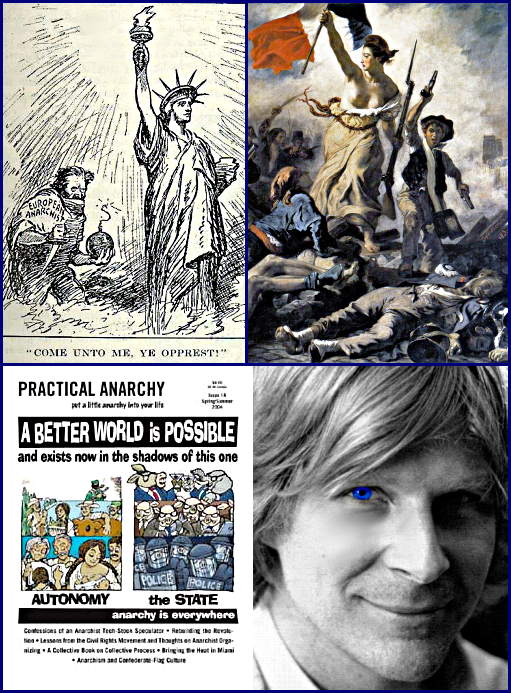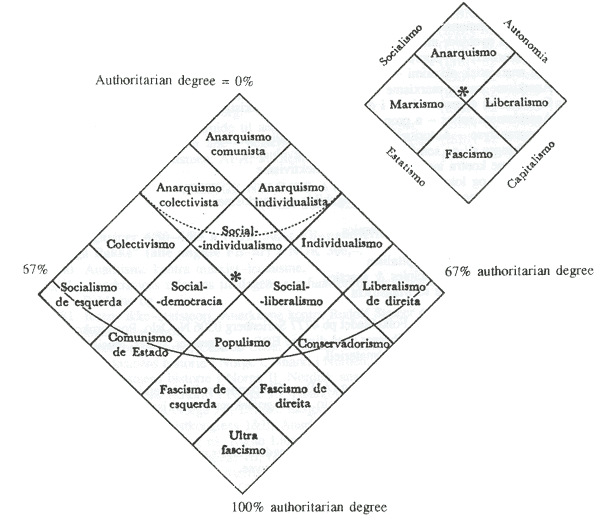
Which is the Real Anarchist?
Webster's Third International Dictionary, succinctly defines anarchism as, “a political theory opposed to all forms of government and governmental restraint and advocating voluntary cooperation and free association of individuals and groups in order to satisfy their needs.”
Britannica-Webster reads, “a political theory that holds all government authority to be unnecessary and undesirable and advocates a society based on voluntary cooperation of individuals and groups.”
And the New Webster Handy College Dictionary tersely states, “the political doctrine that all governments should be abolished.”
From wiktionary we get:
anarchy
1. absence of hierarchy, power and authority
2. absence of any form of political authority or government
3. political disorder and confusion
4. absence of any cohesive principle, such as a common standard or purpose
5. without rules or laws (syn: anomie, anomy)
6. self-government
Finally my standby Random House Webster's yields:
an-ar-chism (an'uhr kiz uhm) n.
1. a doctrine urging the abolition of government or governmental restraint as the indispensable condition for full social and political liberty.
2. the methods or practices of anarchists.
[1635-45]
Now that's all patently prettier than poetry and even in good keeping with its Greek roots - so where's the rub? Well as we've seen with “monetize”, there are always plenty of quasi-literates who need to bend straight clear concepts into twisted pretzels promoting perverse purposes.
For a good sampling of what I'm talking about just drop “anarchy” into your favorite search engine, and you'll quickly find this simple idea contorted & complicated. The following quote characterizes one major branch of colonization as raw as you'd want: “Anarchism is really a synonym for socialism. The anarchist is primarily a socialist whose aim is to abolish the exploitation of man by man.” - Daniel Guérin, Anarchism. As you might anticipate, we also find: 1) anarcho-syndicalists who crave a high degree of societal structure, 2) worker's control of the means of production and distribution, 3) opposition to personal property ownership, 4) parecon, etc. Particulars include: Russian anarchists Mikhail Bakunin (1814-1876) and Peter Kropotkin (1842-1921) - Mutual Aid, Fields Factories and Workshops plus The Conquest of Bread, plus Pierre Joseph Proudhon - What is Property?.
www.zmag.org has done us the unwitting favor of being our excellent anti-thesis. Their “ownership” article advances positions diametrically opposed to SUYO. One of their super sentences state, “You can think of it as if no one owns any means of production or as if each person owns an identical share of every item that is a means of production, where that ownership conveys neither rights nor responsibilities.” Sounds great to me for all those repulsed by responsibility (or especially “productive tools”). To continue, “You may own clothes, but nothing that could be construed as productively useful.” So I guess you'd better be pretty careful about making yourself a hammer. It's probably best to ask permission first just to be safe.
To get an idea about what I mean by complicating things (as if the forgoing wasn't enough), The graphic below was found in a paper on www.anarchy.org:

At the other (apparent) extreme, we're all familiar with the habitual characterization the status quo power holders love to use to depict anarchy - namely terrifying bloody violence and chaos. Alexander Berkman took a futile stab at defusing this incessant ignorance when he insisted, “I must tell you, first of all, what anarchism is not. It is not bombs, disorder, or chaos. It is not robbery or murder. It is not a war of each against all. It is not a return to barbarianism or to the wild state of man. Anarchism is the very opposite of all that.” Naturally, in the grand plan of petty politics, any clarity imposing a threat to the current establishment will always be muddied with poisonously shameless emotion based rhetoric. In these killing fields you will find no moral consistency nor fidelity to logic. During the big bloody war your allies are the sainted princes of peace, but afterwards they're the essence of evil while your former enemy plays the part of the new pet. Both political terms and parties constantly evolve into their anti-thesis over time per the dictates of a spinelessly brutish quest for advantage (so toying with “anarchism” is wholly expected). The only invariable strategy is political expediency (i.e. power at any price). How does the reasonable (wo)man fight and reform such a thing? Well you don't of course. The only real and dignified option is to step outside that incestuous cesspool as much as possible and work entirely apart of such madness. Using free/open YeNoms over proprietary monies will decisively empower such options, the only question is will we live to see it. The Internet is about communication and the necessary result of that (over time) is a hastened death of the unworkable (i.e. belief in the state).
But I've gotten sidetracked, which in this case is probably even more pertinent than my main point. What then was my original objective? This: I am no longer comfortable with using “anarchy” as the key term to best describe the basic foundation for YeNoms and the SUYO objective. And while I stand ready to defend & bash perhaps even more tenuous words like selfishness & evil; “anarchy” has the additional problem of being too emotionally provocative. I need to do a whole post dedicated to the moral problem of arguing a position with ‘emotion’ over ‘reason’ (plus some meta issues with those two words). For now let's put it thus: How does one compete with a bold bare breasted woman treading over provocatively posed dead bodies? Well, there are plenty who would like nothing better. But as for me, I want nothing to do with this sort of sensation based arena (except to expose it from time to time as necessary). I instead prefer more boring, less excitable, less political charged words. So in lieu of “anarchy” I shall be using terms & phrases such as:
* self-determination * choice respecting *
* personal volition * individual free will *
